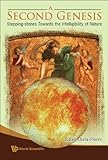A second genesis : stepping-stones towards the intelligibility of nature / Julian Chela-Flores.
Material type: TextPublication details: Singapore ; Hackensack, NJ : World Scientific, ©2009.Description: 1 online resource (xviii, 229 pages)Content type:
TextPublication details: Singapore ; Hackensack, NJ : World Scientific, ©2009.Description: 1 online resource (xviii, 229 pages)Content type: - 9789812835048
- 9812835040
- 9786612441073
- 6612441070
- 1282441078
- 9781282441071
- 576.8/39 22
- QH326 .C48 2009eb
- online - EBSCO
| Item type | Current library | Call number | URL | Status | Notes | Barcode | |
|---|---|---|---|---|---|---|---|
 eBook
eBook
|
Biblioteca "Angelicum" Pont. Univ. S.Tommaso d'Aquino Nuvola online | online - EBSCO (Browse shelf(Opens below)) | Online access | Not for loan (Accesso limitato) | Accesso per gli utenti autorizzati / Access for authorized users | (ebsco)305234 |
Includes bibliographical references (pages 137-164) and index.
1. Introduction 2. An Integrated Study of Western Civilization 3. From a First to a Second Genesis 4. Implications of a Second Genesis 5. The Destiny of the Universe 6. The Destiny of Life in the Universe 7. Towards the Intelligibility of Nature 8. Towards the Intelligibility of Life 9. Is Life Ubiquitous in the Universe? 10. Testing the Universality of Biology 11. The Emergence of Intelligence in the Universe 12. Intelligibility in the Dialogue Between Science and Religion 13. The Ultimate Frontier of Science and the Humanities 14. Can Nature be Intelligible.
Print version record.
A Second Genesis enquires why nature is intelligible. The fast growth of technology and deeper understanding of the humanities have provided significant clues. Answering the question why nature can be understood requires an introduction to the new science of astrobiology and the exploration of the Solar System. A careful discussion of a "second Genesis" is presented, namely our present awareness that life may have emerged on other worlds. Writing this volume has been motivated by the need to encourage a constructive dialogue between science and faith. Such an objective for a new book is timely, since science is inserted with well-defined frontiers in the context of human culture. Similarly, the frontiers of faith do not require religion to justify itself in scientific terms, avoiding current unnecessary controversies. This book intends to engage readers interested in the position of humans in nature. It makes a serious effort to avoid demanding detailed knowledge of science, philosophy, or theology, but will require some careful reading and meditation.
English.


